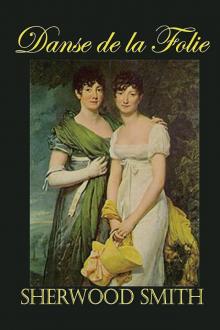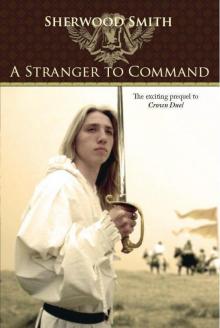- Home
- Sherwood Smith
Revenant Eve Page 8
Revenant Eve Read online
Page 8
There were no lice in her curls, thanks to Mrs. Cobb’s vigilance. Before the exhausted kid could sleep she had to stumble through a prayer with Aunt Kittredge correcting her English and her theology every step of the way. Aunt Kittredge instructed Providence on how to run the world, and then lectured the Almighty on how humble and grateful she was. Aurélie dutifully repeated every sentence, though it was clear she comprehended about a tenth of it.
After that, Aurélie was finally left alone, and before she slid into sleep—and I into a dream state—I heard her whispering a prayer in French, a confused jumble of the Latin rosary and a plea for protection of those at home.
The next morning, Aurélie didn’t come to the mirror to talk to me. After breakfast, she followed Cassandra up to the schoolroom to be introduced to Miss Oliver, the governess. As the latter got Diana settled, Aurélie was permitted to wander around and look at the books and toys. None of them seemed to catch her interest until she discovered an old and extremely battered spinet that had been shoved into the far corner. She examined it closely, fingering the back as she sought the expected bellows.
But there was no bellows. So she gently pressed the keys, and smiled at the sound. It was tinny compared to a modern piano, but it was not nearly as awful as the reedy squeal and moan of her regal.
She sat down and plucked out a melody, hesitant at first. Miss Oliver, the governess, was a serious woman of about forty. She finished setting Diana to tracing out her letters and came to place written music before Aurélie. On discovering that she’d been taught to read music by her French grandmother, Miss Oliver conducted Aurélie in great state downstairs to the more formal salon, in which resided a fairly new Viennese fortepiano.
Aunt Kittredge appeared from the morning room as Aurélie sat down to the instrument, softly experimenting with its touch and tone. Delighted with the shimmering, ethereal sound, she launched into a French air, causing the adults to exclaim in delight. She did not see Cassandra’s jealous pout. Nobody saw it but me.
Aunt Kittredge showered praise on Aurélie for her diligence and taste, finishing with a declaration that Miss Oliver must instantly begin her lessons on the fortepiano.
If Miss Oliver was offered additional pay for getting an extra student added to her workload, I didn’t hear it.
For the next few days, Aurélie was the favorite of the parents. They consulted her about favorite dishes. They corrected her English gently, and smiled at her quaint expressions. When they asked if the kids wanted to do something, it was always Aurélie they spoke to.
She was almost never alone, which meant she wasn’t thinking about me. I suppose I could have poked her (I didn’t know how that worked, as I had no hands) but I knew how much she hated that. And she didn’t seem to be ready for my big speech anyway—she was too bewildered by all the changes in her life.
So I waited and watched as everybody tried to adjust to the newcomer. Cassandra, who should have been Aurélie’s natural ally, veered between making a pet of Aurélie and bossing her. Cassandra reacted to each sign of her parents’ indulgence of Aurélie as if something had been taken away from her.
Aurélie was looking more and more deer-in-the-headlights. She picked at her food, eating so little that at first no one noticed that she lived mainly on bread and cheese, with greens when they were offered. By the end of the week, she looked listless, and admitted to a headache. The Kittredges let her stay with the servants and sleep while they went off to church.
Another day or two brought a startling change in the weather. The glorious autumn colors seemed to change overnight to gray and brown, the world weeping from under a sky the color of iron. Poor Aurélie couldn’t get warm, no matter what.
She only came to the mirror once. “Duppy,” she said, her eyes brimming with tears, “can you see Jamaica? Maman and Tante Mimba? Nanny Hiasinte?”
On each I shook my head. Then I pointed at her, saying, I see you.
“You cannot hear Nanny, then? You do not hear the wisdom of the lwa?”
I shook my head twice, and began to mouth out my prepared speech about myself, but she turned away on the first word and dropped down onto the hearth, a disconsolate little huddle.
She didn’t want to leave the fireside, though the governess believed in vigorous walks each day at noon, unless there was a storm. Aurélie stopped practicing the fortepiano, causing the severe Miss Oliver to mutter about spoilt children, though Aurélie was too miserable to care.
Cassandra loudly went about her lessons, clearly reveling in praise that I suspect she’d been used to getting before Aurélie and her gigantic dowry appeared and used up the lion’s share of the adults’ positive attention.
Aurélie’s headache and listlessness developed into a full-on cold. One morning at breakfast when she couldn’t stop coughing, the adults leaped to ply her with remedies—the most common for pretty much any childhood illness being a whopping dose of calomel, which Aurélie refused to take.
“I will not have it,” Aurélie whimpered tearfully. “Calomel is evil. My duppy said so—”
“Who is your ‘duppy’?” Aunt Kittredge cut in. “Is that what you call your mother, or your medical man? Had you a medical man on Kittredge Plantation?”
“My duppy is visible only to me. And to my Nanny Hiasinte,” Aurélie corrected herself. “Nanny saw my duppy when she made obeah.” And at their looks of puzzlement, “Obeah is magic—”
Aunt Kittredge’s face mottled. “Lady Aurélie de Mascarenhas. You shall cease your wicked, heathen talk in this house!” she stated, too angry to remember even that big fat dowry.
“My duppy saved Maman when she was wounded by pirates,” Aurélie declared, her voice wavering.
“Pirates?” James spoke up in the background.
“Where were you?” Cassandra asked. “Did you actually see them, or is this a taradiddle?”
“I fought pirates,” Aurélie said to either side. “With my own pistol.”
James whistled. His mother turned a killer scowl his way, then said with such saccharine sweetness I’m surprised they didn’t all drop dead of diabetes, “Lady Aurélie. We have permitted you to remain by the fireside for your health of a Sunday, while we attend divine service, but perhaps we have been too lenient.”
Aurélie said, “I am ready to be baptized in your ways. I know it is coming, me.”
Before Aunt Kittredge could speak, Uncle Kittredge said quickly, “You are a very good little girl. You know by instinct what is right. Doctor Warren will instruct you in your Collect. We will see to that.”
When breakfast was finished, Uncle Kittredge sent the kids to the schoolroom.
James followed, and as soon as the door was shut, he said, “Pirates?”
Aurélie settled herself on the hearth and wearily took up the book they were studying. “The pirates attacked Kittredge Plantation. It was before I entered the ship to come to England.”
“Did you really fight them?” James asked.
“Yes.”
Cassandra turned on her little sister, who was crouched over a book at the work table. “Go over there to the toy chest,” she commanded. “You are not to listen.”
Diana pouted. “I will tell Mama if you have secrets from me.”
“Go,” Cassandra ordered. “And if you tattle, you better check your bed for spiders every night. Big, hairy ones. And you will never know if you got them all.”
Diana ran wailing from the room.
James sighed. “Now she’ll peach.”
Cassandra tossed her curls. “If she does, I’ll say I only warned her about spiders, and ask Mama to keep her in the nursery. We cannot hear over her grizzling.”
“Tell us about pirates, Cousin,” James asked, leaning forward.
Aurélie did, much as she’d told the midshipmen.
“So you can load and shoot a pistol?” James asked.
Cassandra affected a shudder.
“I am ver-ry good,” Aurélie said. “But I must practice, this
I know.”
James grinned “By thunder, there’s scant chance of that. If Mama hears about it—”
Footsteps on the landing outside the schoolroom parted the three. James dashed through the opposite door, and Cassandra took up a book of inspirational quotations as Aunt Kittredge appeared, the governess just behind her.
Everyone was dismissed, and Aurélie put to bed, after a mega-long prayer in which God was told how every religion was straight from the hands of the devil except Aunt Kittredge’s, and Aurélie begged forgiveness for harboring any thought but what she was told by her elders.
By Sunday, Aurélie was over the worst of her illness and found herself bundled along with the family to church.
On their return, there was cold food, and for the first time, her aunt noticed her avoidance of meat. “Eat a slice of beef,” Aunt Kittredge said. “It is very good and particularly sustaining.”
Aurélie shook her head. And when her aunt demanded a reason, she said softly, “I promised my great-grandmother not to eat meat.”
“Filthy Papist habits,” was her response.
Uncle Kittredge said more mildly, “My understanding is, they only avoid meat of a Friday, and perhaps during Lent.”
Aurélie looked down as her aunt chided her with a determined smile, asking her to consider what people will think. Was she setting up to be too fine a lady for the excellence of Undertree beef and pork?
Aurélie said, “Your foods are very good. My favorite is the boiled oats with honey and milk. I like it, oh, much!”
That seemed to mollify Aunt Kittredge, and Aurélie was permitted to retire to the schoolroom. That woman is going to be trouble, I thought.
Aurélie sat down at the spinet, a blanket pulled around her. She seemed as depressed by the bleak northern light as by the weather, for though her fever appeared to be gone, she was listless. She touched the keys, clapped her arms to her sides as if to shut out a draft of cold air, then she sat in a small armchair with a book, her feet tucked under her.
James appeared in the schoolroom a bit later. “What did you think of church?” he said in the tone of one inviting complaint.
Aurélie’s face cleared. “Oh, the music is very beautiful. It’s also interesting, how your church has many things similar to Holy Mass on Saint-Domingue. But Holy Mass is in Latin. Grandmère had her Gallican Missal, and everybody had a book in your church. My religion in Jamaica is not written down, it’s taught by speaking, by singing, by dancing. I’m glad that I find a new way to le bon Dieu in each country, and do you think that if I am baptized here, too, it will give me extra protection? Three is an important number. This vicar said so, many times.”
James twitched a shoulder in a dismissive shrug. “You can ask Charles, my cousin once removed, if we visit him in Yorkshire. It is said of him that he will be a man of brilliant parts, though my brother Will is a fine scholar. They intend Cousin Charles for the law, but he wants to go into the church and will spout off as much as you like about such things at the doff of a hat. Will you tell me more about pirates? How many fights did you see?”
“I think three, though perhaps there were more when I was small. I don’t remember. The ones I remember, I sailed with my mother.”
“I thought your father was the sea captain?”
“Yes. But he died when I was small.”
“Did he gabble the Spanish lingo at you?”
Aurélie gazed into the fire from her accustomed spot on the hearth. “I don’t remember any Spanish. I remember Je t’aime, ma petite. That is French. He had so deep a voice, very deep. He smelled so good. He had a smile like the north star, so bright in the night sky, crooked-y, with one side curled up. Everybody loved his smile, that much I remember. But after he died I had to go and live with my grandmother, for so very long a time.”
“Where was your mother?”
“Sailing with my Uncle Thomas.”
“A woman? Sailing? What did she do, mend their sails?”
“No, she is a ver-ry good captain. She and Tante Mimba, they taught me to fight with my rapier.”
“Were you good at it?” James asked skeptically.
His tone roused Aurélie. “I am good. I can beat some of the boys, and when we first came to Jamaica, I beat Harry one time.”
“When the weather warms up, we’ll see how good you are,” James promised.
It was probably intended as a threat, but Aurélie smiled. “I would like that, oh, much, for I must get the skill to defend myself, Aunt Mimba said. Thank you, Cousin James.”
Aurélie avoided the mirror all that winter, so time slid by for me super fast. The only thing that roused her out of her lethargy was her birthday, which, like Cassandra’s, was celebrated with a special cake full of currants, and with little gifts—a handmade reticule from Cassandra, and a gold cross from the uncle and aunt. She also roused when she wrote letters to her mother, long badly spelled and blotted passages about how ill she felt, how cold it was, how very much she wanted to go home.
Each Friday, when Cassandra brought to her mother the weekly letter she wrote to her maternal cousin Lucretia, Aurélie also handed off a letter to be sent to Jamaica. She began counting up how many days until she could expect her first answer.
Although Cassandra received regular missives from Cousin Lucretia, when spring showed its first signs, there was still no letter next to Aurélie’s plate at breakfast.
Around the time of the first thaw, Aurélie finally started talking to me in the mirror again.
“Do you see me all the time?” she asked.
I brought my head down in a nod.
Her gaze sidled one way, then the other, as her skinny fingers twitched at her high-necked gown, then she whispered, “Even when I am in the bath?”
So she’d hit that age. I wanted to laugh, but I was afraid she’d see it. How to explain that all the habitual tasks that we do on autopilot were a blur to me? Keep it simple, I thought.
I mimed sleep, and saw immediate relief in her face. “So you wake up when I talk to you?”
Not quite. Time stopped blurring whenever she was alert or intent about something, but again I opted for the easy answer, and nodded.
So she started talking to me once or twice a day. She paid no attention to my attempts to respond, now that she knew I didn’t have telepathic powers or connection with her loved ones on the Spirit Net. She talked for her own comfort, mostly complaining about the never-ending cold and darkness, her confusing dreams, and how tedious were her lessons, mixed up with anxious wonderings about why Maman had not written back. Maman seldom went into Kingston—there might be hurricanes—the English ship might have gone off course, or had to stop at the other islands.
She also reminisced wistfully about her life in Jamaica, including what she’d learned from Nanny Hiasinte. I gathered that lwa and duppies, as supernatural beings, were too strange to be understood. Like adults and their inexplicable behavior, only more so. Maybe that was why she had no apparent interest in me, except as a listener. And until we figured out how to actually talk, I wasn’t going to be much use, but I figured it had to come.
My biggest worry was always Alec. I kept telling myself that there had to be a way around this time travel thing—that if I managed to get Aurélie safely to Dobrenica, I’d find myself stepping out of that mysterious door a second after I’d stepped in, in which case Alec would never even know I was gone.
I held hard to that image.
Meanwhile, life went on at Undertree.
Lessons were strictly organized. Aurélie adapted quickly, except for the French lessons. She and Miss Oliver clashed, neither being intelligible to the other. Being a marquis’s daughter, Aurélie was exempt from the threat of the ruler, unlike poor, near-sighted little Diana, who often blotted her paper as she crouched over it to write. But the governess was adamant when she declared first that it was unbecoming for girls to correct their betters, second, that Mrs. Kittredge had hired her specifically for the elegance of her Fren
ch (it was the same French that Aunt Kittredge had been taught) and furthermore, Aurélie’s accent was decidedly “colonial.” I could have told Miss Oliver that her French, unlike Aurélie’s, only slightly resembled anything actually spoken in France, but nobody was asking me!
Aunt Kittredge ended the matter by declaring that Aurélie was excused from French lessons. She was permitted to read any of the French texts in the schoolroom, but she must not interfere with Miss Oliver’s teaching of the other girls.
Time whizzed by uneventfully after that.
When the thaw became real, servants threw open the entire house to clean it thoroughly, and the strengthening sun improved Aurélie’s spirits and energy. She returned to playing the fortepiano and was far better at it than Cassandra, who had the decided advantage in singing. Aurélie’s husky contralto was deemed too low—a clear soprano was the fashion—so it was decided she’d forego singing in favor of playing, which meant the girls no longer shared musical lessons.
One balmy March day, James showed up while Cassandra was downstairs in the salon, having her lesson. He seldom appeared in the schoolroom, being more or less under his father’s tutelage. Since he was intended for the army, nobody appeared to be concerned if he actually read any of the books his father occasionally put his way.
Aurélie often sat by the schoolroom window, warming herself by the strengthening sunlight. She was there one day, doing some fine sewing as Diana struggled through conjugating French verbs for Miss Oliver.
James strolled in, obviously bored and looking for distraction. Seeing Aurélie sitting alone in the window seat, he beckoned, a grin flaring in his pimply face. Aurélie put down her sewing and followed him to the other window. “The gallery has warmed up enough to go into without freezing,” he whispered. “You said you know the art of the duello. Show me.”
Her whole demeanor brightened. “Yes.” Then clouded. “But these skirts. I can’t fight, for I shall tread on my hem. And I couldn’t put my René clothes into my trunk. They said I cannot be René in England.”

 Inda
Inda Danse De La Folie
Danse De La Folie King's Shield
King's Shield Whispered Magics
Whispered Magics Fleeing Peace
Fleeing Peace Barefoot Pirate
Barefoot Pirate Crown Duel
Crown Duel Mearsies Heili Bounces Back
Mearsies Heili Bounces Back Commando Bats
Commando Bats A Stranger to Command
A Stranger to Command Lhind the Spy
Lhind the Spy The Spy Princess
The Spy Princess Blood Spirits
Blood Spirits Sasharia en Garde
Sasharia en Garde Lhind the Thief
Lhind the Thief Paradise Drift
Paradise Drift Banner of the Damned
Banner of the Damned The Trouble With Kings
The Trouble With Kings Poor World
Poor World Treason's Shore
Treason's Shore Wren Journeymage
Wren Journeymage A Posse of Princesses
A Posse of Princesses Revenant Eve
Revenant Eve Once a Princess
Once a Princess Time of Daughters I
Time of Daughters I Rondo Allegro
Rondo Allegro Coronets and Steel
Coronets and Steel Over the Sea
Over the Sea Senrid
Senrid Hunt Across Worlds
Hunt Across Worlds A Sword Named Truth
A Sword Named Truth The Fox
The Fox Twice a Prince
Twice a Prince Fair Winds and Homeward Sail: Sophy Croft's Story
Fair Winds and Homeward Sail: Sophy Croft's Story Time of Daughters II
Time of Daughters II The Rifter's Covenant
The Rifter's Covenant The Phoenix in Flight
The Phoenix in Flight Stranger
Stranger The Thrones of Kronos
The Thrones of Kronos A Prison Unsought
A Prison Unsought Twice a Prince: Sasharia En Garde Book 2
Twice a Prince: Sasharia En Garde Book 2